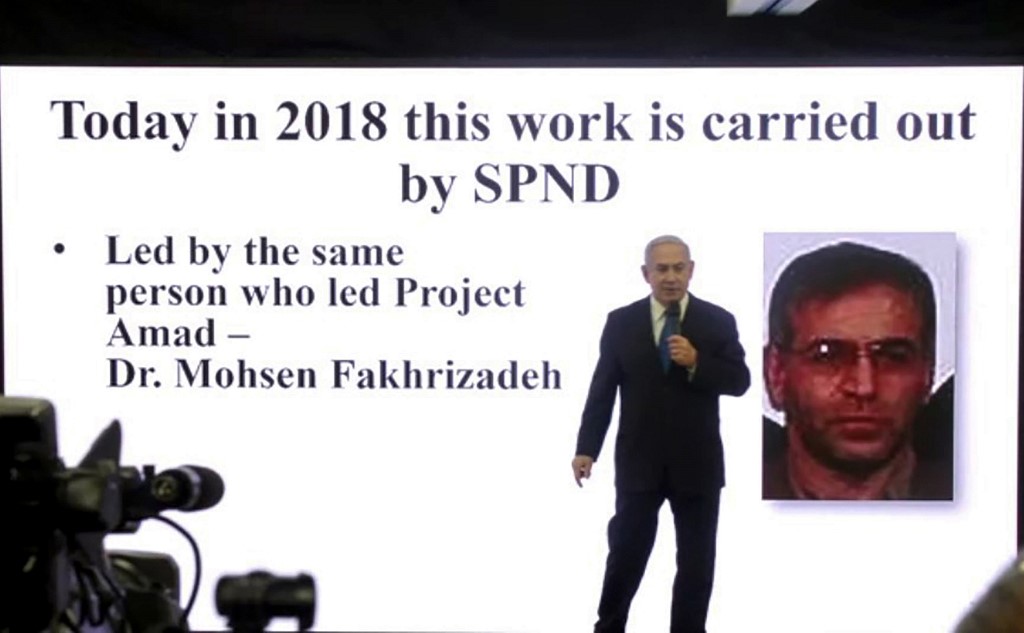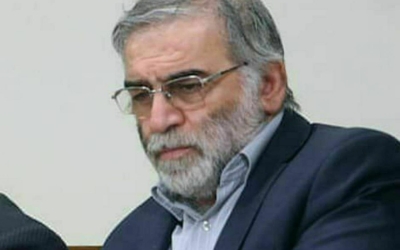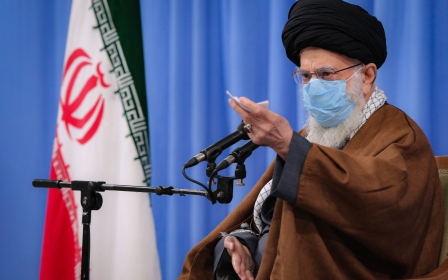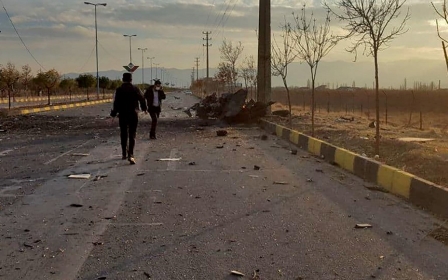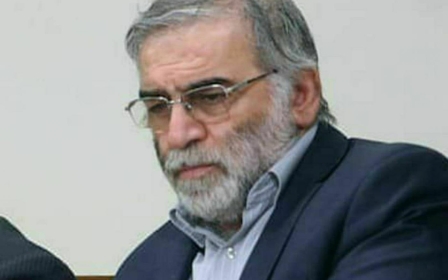Assassination of top Iranian nuclear scientist sparks a blame game in Tehran
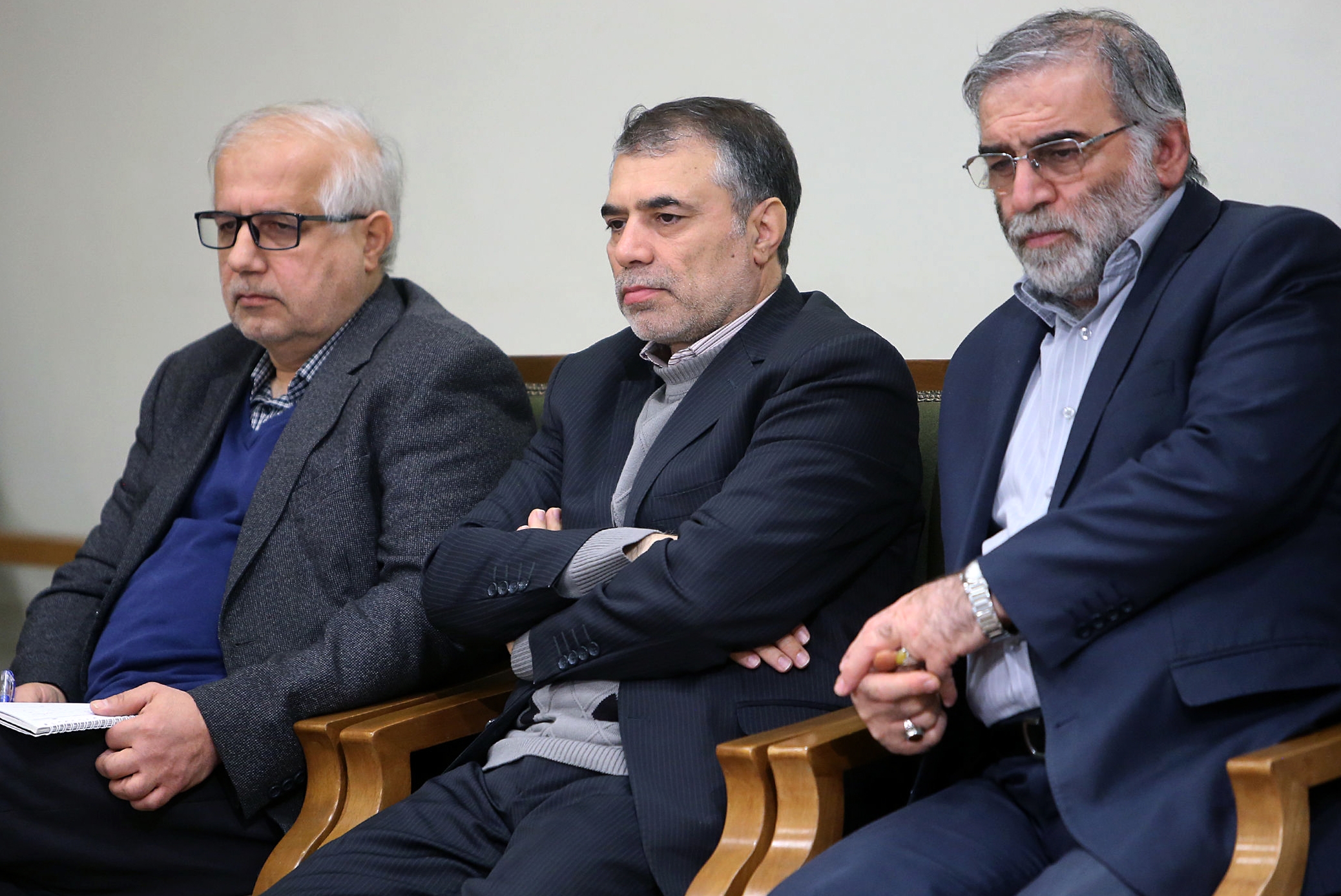
It was around 4:30pm in Tehran that reports emerged about the assassination of Mohsen Fakhrizadeh, a top nuclear scientist, by an armed group suspected of links to Israel.
Fakhrizadeh, who wasn't a publicly well-known figure, was a physics professor at University of Imam Hussein, the defence minister's deputy and the head of the Research and Innovation Organisation for the ministry.
His death has been seen in some quarters as linked to the victory of Joe Biden in the US presidential elections. Biden has promised to return America to the 2015 nuclear deal with Iran, which has alarmed Israel and pro-Israel politicians in the US.
Speaking on condition of anonymity, a former Iranian official told MEE: "It is obvious that [Israeli Prime Minister Benjamin] Netanyahu is striving to kill two birds with one stone. On one hand, he wants to create an excuse for a US-led attack on Iran's nuclear sites, and on the other hand he wants to put an unremovable obstacle in the way of Iran-US de-escalation and Biden's rejoining the [nuclear deal].
"The obstacle will be at least raising pressures on [Iranian President Hassan] Rouhani's administration by the emboldened hardliners and the establishment to decrease the level of cooperation with the IAEA [International Atomic Energy Agency] and not to adopt a new posture towards the future administration of the US for detente."
New MEE newsletter: Jerusalem Dispatch
Sign up to get the latest insights and analysis on Israel-Palestine, alongside Turkey Unpacked and other MEE newsletters
How was he assassinated?
According to the Iranian Revolutionary Guard Corps-affiliated Tasnim news agency, the attack occurred at 2:30pm, while Fakhrizadeh was in Aabsard county, close to Tehran. As his car was passing a pick-up truck, the truck exploded and a group of armed men opened fire on him, leading to his bodyguard being shot four times.
However, Fars, another IRGC-affiliated news agency, published a slightly different and likely more accurate account of the incident. At first, Fakhrizadeh's car and two cars of his bodyguards were stopped as a group of men started constant shooting, and then a pick-up truck full of timber exploded in front of the car.
"After the explosion, the terrorists who had ambushed [them] began shooting at the car of the nuclear scientist from an unclear point," reported Fars, adding that one of the bodyguards put his car in front of the gunmen to protect Fakhrizadeh, leading to his "martyrdom".
Fakhrizadeh was soon taken to hospital, but his wounds proved fatal.
Iran's state TV said that "based on unconfirmed reports," one of the gunmen had been captured.
'Remember that name'
According to General Amir Hatami, Iran's defence minister, Fakhrizadeh was "in charge in the field of nuclear defence in the Ministry of Defence, and the issue of nuclear defence and his [ties] with nuclear scientists had made him famous as a [nuclear scientist]".
He added that the use of "lasers in air defence or the detection of intruding aircraft by means other than radar" was also among his work. Fakhrizadeh, who was called "Mr Mohseni," was also active in missile programmes too.
Hatami said a rapid Covid-19 test kit was produced under the supervision of Fakhrizadeh and claimed he was also successful in developing a coronavirus vaccine, which is in the first phase of human trials.
While relatively little known within Iran, Fakhrizadeh had gained a reputation in foreign intelligence circles.
In 2018, Israeli Prime Minister Benjamin Netanyahu claimed that Iran has designed a nuclear payload on Shahab 3 missiles and was expanding its range for nuclear-capable missiles that could reach Riyadh, Tel Aviv and Moscow but were planning for a much further reach. He identified Fakhrizadeh as the head of the project and told his audience to "remember that name".
In an interview with Kan TV in 2018, former Israeli prime minister Ehud Olmert also warned that Fakhrizadeh would "have no immunity".
Prior to this, in 2017, Saudi Arabia's Al-Arabiya covered a summit of the exiled Mojehedin e-Khalq (MEK), a controversial opposition group once on the US terrorism list, at which the organisation claimed Fakhrizadeh was behind Iran's project for producing a nuclear weapon.
Fereidoun Abbasi, an Iranian MP, said that Fakhrizadeh had survived a similar attack 12 years ago.
In recent years, five other top nuclear scientists have been assassinated in Iran. The latest assassination happened only a few days ahead of the anniversary of the killing of nuclear scientist Majid Shahriari in 2010.
Criticisms of Iran's security apparatus reaches its peak
While many in Iran believe that Israel was behind the assassination of Fakhrizadeh, on social media many Iranians slammed the security apparatus for its failure to protect their country's nuclear scientists.
Some complained that the intelligence forces were wasting their time arresting innocent journalists and researchers while the real spies are wandering freely in Tehran.
'We should [study] what weakness there is in the structure of Iran's security apparatus, which despite the possibility of assassinating people like Fakhrizadeh and providing bodyguards for them, the Israeli operation still succeeds'
- Hossein Alai, retired general
"I'm more angry with the security apparatus, which is arresting university professors, lawyers and journalists while the wolves are committing assassination in broad daylight," wrote Sharare Dehshiri, an Iranian user, on Twitter.
Another user under the name of "elsolito" tweeted: "The intelligence organisations must answer to the public about what are they doing exactly? What happened to all your claims of having intelligence monitoring?
"When you are searching for spies among environment activists, journalists and protesters, the result is today's catastrophe, when the country's [top people] get assassinated in the heart of the country in the broad daylight."
Meanwhile, retired General Hossein Alai, a reform-minded figure and former commander of the IRGC Naval force, called for a reassessment of the performance of the security apparatus.
"We should [study] what weakness there is in the structure of Iran's security apparatus, which despite the possibility of assassinating people like Fakhrizadeh and providing bodyguards for them, the Israeli operation still succeeds," argued Alai.
He emphasised that "the assassination of Dr Mohsen Fakhrizadeh by Israel indicates that the Israeli spy and operational circle is still active in Iran".
Simultaneously, Hesam Ashena, a senior adviser to Iran's president and a former top intelligence official, called for an "Integrated Intelligence and Security Command" and "synergy of abilities instead of low-yield competitions [between intelligence agencies of Iran]".
Hardliners point at President Rouhani
Iran's hardliners have accused President Hassan Rouhani of complicity in Fakhrizadeh's death after his administration allowed Yukiya Amano, a former head of the International Atomic Energy Agency, to meet the slain scientist.
Javad Karimi Ghoddousi, an Iranian MP, tweeted: "Mr Rouhani, during your presidency over the executive branch, and with the insistence of the enemy and the emphasis of you, Dr Mohsen Fakhrizadeh met with Amano."
However, Raja News, close to hardliners, denied the allegation brought up by Karimi Ghoddousi. Hassan Shojaie, another MP, claimed that Fakhrizadeh was asked by "pro-western" officials in Iran to meet Amano but the supreme leader, Ayatollah Ali Khamenei, did not allow it.
In a report published on the hardline Mashregh News site in 2014, the IAEA had urged Iran to provide them a meeting with Fakhrizadeh.
Impeding diplomacy
"The reason for assassinating Fakhrizadeh wasn't to impede Iran's war potential, it was to impede diplomacy," tweeted Mark Fitzpatrick, a former senior US diplomat.
That seems to be working to some extent, as the hardliners have already raised pressure on the Iranian government. Hamid Rasai, a hardline activist and former MP, wrote that Rouhani's administration was putting pressure on Iran's state TV not to call Fakhrizadeh a nuclear scientist, as they see this assassination a "blow" to their "negotiation project" with US President-elect Joe Biden.
Moreover, Raja News argued that "it is not clear why the pro-West [administration of Rouhani] which is serving their last months, is still emphasising ... the failed strategy of compromise".
"What is clear is that the current strategy of the government has portrayed Iran as weak [in front of] enemies and have persuaded them to commit crimes against people of Iran."
Iran is due to hold a presidential election next June.
In the meantime, reformists and conservative newspapers have both called for retaliation.
Headlines used by Iran's newspapers include: "Eye for an eye," "If don't hit them, we will get hit," "Trap of tension," and "The cowardly assassination of Fakhrizadeh".
Prominent reformist and former political prisoner Mostafa Tajzade tweeted: "I unconditionally condemn the assassination of Dr Mohsen Fakhrizadeh. Netanyahu is the first person accused in this crime and seemingly he has no goal other than lighting the fire of war and conflict and preserving the sanctions. Iran can and must expose and isolate the Israeli regime by mobilising global public opinion against state terrorism."
What will Iran do?
In reaction to Fakhrizadeh's assassination, Supreme Leader Ayatollah Ali Khamenei issued a statement calling for investigation of "this crime" and firm prosecution of "its perpetrators and its commanders".
The statement contained no vow of revenge, however, suggesting "strategic patience" was still the plan.
Hossein Kanaani-Moghaddam, a former IRGC commander who headed Iran's forces in Lebanon for period in the 1980s, told MEE: "Iran's reaction to this act of terrorism will be shown based on prudence and in the right time and place."
He added: "Iran will not be influenced and affected by Zionists and will not fall in the trap of Zionists who want Iran to do something that would create a war.
Kanaani-Moghaddam emphasised: "Iran will take revenge from those who ordered this assassination in intelligence organizations of Israel and US."
Meanwhile, Fereidoun Majlesi, a former Iranian diplomat in the US before the 1979 Islamic Revolution, believes that Netanyahu and US President Donald Trump's joint efforts to prevent a de-escalation between Tehran and the incoming Biden administration will continue.
"It is crystal clear that Israel was behind this assassination as they seek to provoke Iran to give them an excuse for military attack or a full-scale war before the end of Trump's presidency," added Majlesi.
However, it seems Iran will continue its "restraint" policy, as Ali Rabie, the spokesperson for Iranian government, has stated that Iran will avenge the assassination, but "not in the game field the [enemy] has designated".
This article is available in French on Middle East Eye French edition.
Middle East Eye delivers independent and unrivalled coverage and analysis of the Middle East, North Africa and beyond. To learn more about republishing this content and the associated fees, please fill out this form. More about MEE can be found here.


